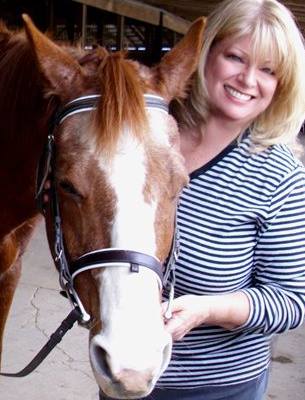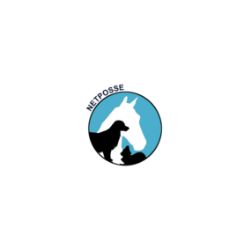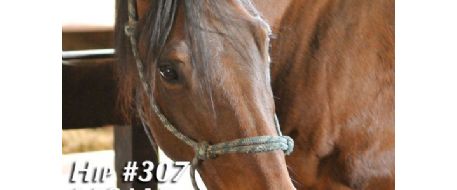
As horse owners, one of the last things we want to think about is what will happen to our horses if we cannot care for them. We may not be able to make decisions about the care of our horses due to death or injury, vacations, school, surgery or sickness, or deployment. We might think we have a plan for someone to care for our pets and horses when we are not able to do so. However, what happens if our designated caregiver is taken ill, fails to perform the duties and care agreed upon, or if the caregiver feels the care our animal requires is more than they are able or willing to provide?
When we think of horses lost or stolen, we tend to think of horses physically removed from our property or boarding barn in the middle of the night. There are many, many such cases where fencing is cut or locks removed. However, there are also horses moved in the light of day with the consent and knowledge of our designated caregiver.
Horses that don’t belong in auction houses sometimes end up there behind the backs of trusting owners more and more often. If your horse is lucky, they will be purchased by a caring new owner and will live happily ever after. However, many are purchased by horse dealers and traders who "flip"horses like real estate to make money. Your horse may go to a private home or a therapy center, or just as likely, may be headed to the border on their last ride.
How do you make sure that your horse is waiting patiently for your return from vacation, surgery, deployment or school? How do you ensure your horses’ future in the case of your death? Do you think you have it covered with a handshake agreement with your spouse, best friend, horse trainer or barn manager? THINK AGAIN.
Attorney Debra Hamilton of Hamilton Law and Mediation, PLLC says many of us avoid making a plan that is legally solid and binding, because it is emotional. She recommends that pet and horse owners alike take steps to not only make a plan, but also to reality test that plan with the help of a neutral party who is fluent in the language of your pet (dog, horse, etc.).
In my recent conversation with Ms. Hamilton, I learned that having a plan is more than a handshake agreement or even a written agreement. Leaving money in a will for your horse does not mean it will ever be spent on your horse or spent in the manner you intended. Providing for your horse in your will, also means until your will is probated, which can take between six months to a year, it will not provide for care of your horse during that interim period.
Think about that. For up to a year, a caregiver or executor of your estate or will, may not even THINK that your horse’s very life can be in jeopardy. Think about what your horse needs on a regular basis besides the obvious food and water. Does your horse need regular medication, vet visits, chiropractic visits, and special feeding routines? Does your horse require regular turn out but only with a certain group of horses (i.e.mares, geldings etc.) Farrier visits even for unshod horses is something we would expect, but does your caregiver have the ability to provide for all of these things in the interim between your death and when your will is probated?
If you are deployed, vacationing out of the area, or attending school across the country, who will advocate in the best interest of your horse in your absence. We would think a phone call would be made to ask us for a plan of action in the event that the boarding barn is sold or for any reason that our chosen caregiver no longer can care for our horse, but the reality is, your horse’s care may be the last thing considered in such a situation. In the event your horse's sickness or injury, attempting to get in touch with you, may cost your horse precious time if you are not immediately reached.
Seeking assistance and advice to help navigate the legal system to ensure your horse’s care is strongly recommended by Hamilton. A neutral party can help you plan for future care for your horse in the terms most likely to be carried out to your standard.
Hamilton provides a free monthly webinar for owners to help get them get started with thinking about these decisions and making a PLAN. Future planning, redundancy (having a back up caregiver) and trusting a person to follow our directives and address the needs of our horse, is more than providing information and money in your will or in a written agreement to a family member or friend. Hamilton recommends that you have a plan both inside and outside of your will. A pet trust outside of your will allows for your horses needs to be taken care of in your absence until your provisions and directives inside of your will can be fulfilled.
Something many horse owners face is being horse poor. I know I am! The thought of planning for my horses’ care in the interim before my will is probated seemed like an impossibility. We might think about putting a plan in place once we have money to set aside for our horses’ care, but Ms. Hamilton explained that meeting with a financial planner and discussing how purchasing an annuity that can paid into monthly, could fund the trust. A lump sum of cash is not needed in this type of set up. Having an attorney appointed to release the funds prior to probate will ensure no lapse in the care and well-being of your horse.
On a very human level, Hamilton puts it all into perspective by asking, “Is it fair to rely on your family member or best friend to be the ONLY person to take care of your horse?” When we look at the difference in lifespan between a dog (9-13 years average) and a horse (30 to 40 years), there is a good chance that the living situation of your appointed caregiver may change. Your horse may outlive your appointed caregiver, leaving your horse without care and oversight. Having two, three or more appointed caregivers is what Hamilton recommends, with a rescue or sanctuary as an option for your horse’s care should none of your caregivers be able to fulfill your care plan. Be sure to notify and inform a rescue or sanctuary of your wishes.
Conflicts over future care of our horse can involve divorce and custody issues, veterinarian and boarding barn issues as well as issues between co-owners of horses. Preparing ahead of time may reduce these conflicts as well as reduce the chance of losing our horse to a civil dispute.
Providing funds for the caregiver is a consideration as well. Caregivers may be away on vacation, or business and having planned for distribution of funds for the caregiver to hire an interim caretaker is a good idea, says Hamilton. Having distributions monitored by an attorney or neutral trustee would ensure funds are not used for things other than the care of your horse. Not causing any undue hardship for your caregiver may encourage your caregiver to continue to honor your wishes for your horse’s care. Remember, right now your horse might be the picture of health at 4 years old, but in 20 years, that may be very different resulting in the need for additional care.
Hamilton also recommends keeping very detailed information about your horse for ease in identification. This includes freeze branding, tattooing and microchipping. Consider a situation where a caregiver was able to receive disbursements for the care of an animal that was deceased by claiming a similar animal was the original. A solid sorrel quarter horse with no markings and no detailed information about whorls or scars may be hard to determine from another solid sorrel horse. If your trustee is not a “horse person”, one red horse might look the same as another. Scheduled identification checks by microchip scanning, brand inspection or even DNA testing may help to keep your funds specifically linked to YOUR horse.
Once you have your information together and your legal trusts and wills drafted, you MUST tell people where this information can be located. You MUST discuss the details of your plan with ALL of your appointed caregivers. The worst places to store this information is on your computer or tablet or on your phone. These items may not be immediately accessible in the case of an emergency. Keeping this information in a locked desk drawer or safe makes a delay in accessing your information likely. Give your appointed caregivers a copy of the information. Discuss with your barn manager, your trainer, and your vet what your plans are or who your caregivers are in your absence. If your horses are on your property, remember to have a back up plan for a place for your horses to go if legal issues surround the property itself.
Debra Hamilton offers a free Pet Passport to keep your horse and pet information readily available via her website at http://hamiltonlawandmediation.com.
Stolen Horse International provides news and other resources for free on this website. As a charitable organization we survive on the kindness of people like you. Please consider donating to help fund the organization or purchasing a NetPosse ID for your horse, dog or cat to help protect your beloved animals!
Debi Metcalfe





Comments